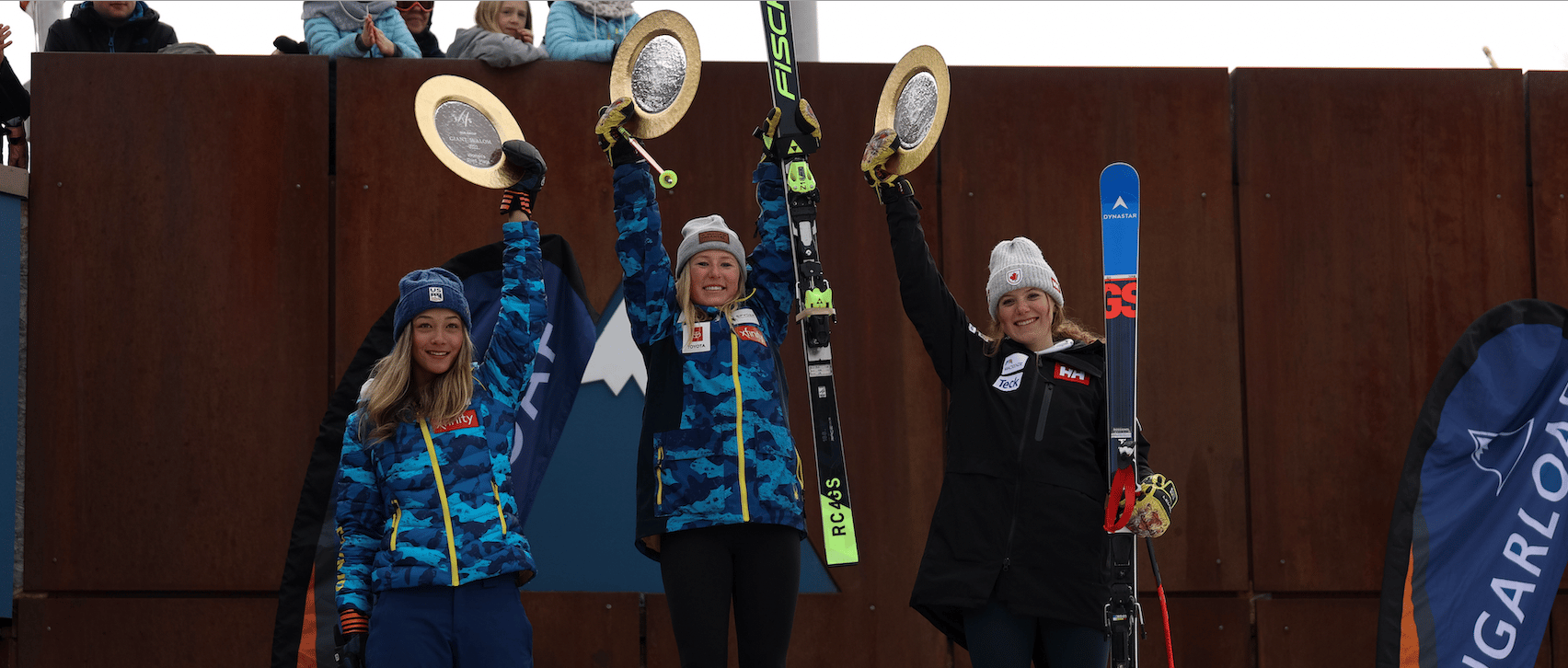Inside the Ski Racing Mind: Prime Ski Racing Attitude
 Prime Ski Racing Attitude
Prime Ski Racing Attitude
In a recent post, I introduced you to Prime Ski Racing which I defined as “skiing at a consistently high level under the most challenging conditions.” Before you can begin developing the essential mental skills that help you experience Prime Ski Racing, you need to establish the right attitude toward your ski-racing participation. This attitude focuses on two areas. First, your attitude toward competition: what you think of it and how you feel about it. Second, your attitude toward success and failure: how you define success and failure and whether you know the essential roles that both ski in becoming the best racer you can be. When you clarify your attitude in these two areas, you will be better prepared to win the “mental race” and to achieve Prime Ski Racing.
Attitude Toward Competition
Ski racing may be important to you. You may put a great deal of effort into your training and competitive efforts. Because of this, you put your ego on the line every time you get in the starting gate. When you don’t ski well, you’re disappointed. This may not feel good, but it’s natural because it means you care about your ski racing.
There is, however, a point at which you can lose perspective and your feelings toward your ski racing can hurt how you ski. The key red flag is what I call the “too zone.” You want to care about your ski racing, but you don’t wan to care too much. You want how you ski to be important to you, but not too important, You want to try hard to achieve your goals, but you don’t want to try too hard.
In the “too zone,” your self-esteem is overly connected to your results, when how you feel about yourself as a person is too influenced by how you ski. If you find yourself in the “too zone,” you have lost perspective on the role that ski racing ski in your life. You should reevaluate what your ski racing means to you and how it impacts your life and your well being. You will probably find that it plays too big a role in how you feel about yourself. When this happens, you not only ski poorly (because you feel far too much pressure with your self-esteem on the line), but you may find that your ski racing is no longer fun for you.
The Prime Ski Racing attitude toward competition means keeping your ski racing in perspective. To ski your best and to have fun, you need to keep your ski racing participation in a healthy place in your life. It may be important to you, but it should not be life or death. Ski racing should be a part of your life, not life itself. Remember why you race: it’s fun, you like the exercise, you like the camaraderie , it feels great to master the sport, and, yes, you like to compete and succeed. If you have fun, work hard, enjoy the process of your ski racing, and do not care too much about results, you will enjoy competing more, you will ski better, and you will be more likely to achieve your goals as well.
Attitude Toward the Ups and Downs of Ski Racing
To achieve Prime Ski Racing, you must also recognize and accept the ups and downs of ski racing. In the history of ski racing, very few racers have had perfect or near-perfect seasons: Anna Marie Proell, Franz Klammer, Ingemar Stenmark, Bode Miller, Lindsay Vonn. Even the best racers have ups and downs. Since they do, then you should expect to have them as well. It’s not whether you have ups and downs in your ski racing, but how big the ups and downs are and how you respond to them. In fact, this blog series is devoted to assisting you in minimizing the ups and downs of your ski racing.
In a down period, it’s easy to get frustrated, angry, and depressed. You can feel really disappointed in how you’re skiing and can feel helpless to change it. You may want to just give up. But none of these feelings will help you accomplish your important goals: getting out of the down period and returning to a high level of skiing. This is a skill that makes the great racers great. The best racers know how to get back to on their game quickly.
How do they do this? First, they keep the down period in perspective, knowing that it’s a natural and expected part of ski racing. This attitude takes the pressure off to rush back to a higher level of skiing (which actually keeps you in the hole longer) and keeps you from getting too upset. It also enables you to stay positive and motivated. Most important, never give up; keep working hard, no matter how bad it gets. Great racers look for the cause of their slump and then find a solution. If you maintain this attitude toward the ups and downs of ski racing, your down periods won’t last as long and you’ll more quickly swing back to an up period.
Attitude Toward Love and Fun
It’s easy to lose sight of why you race. There is the competition, awards, rankings, and attention. Yet, when you get focused on the external benefits of ski racing, you may lose sight of the more important internal reasons why you train and compete. You may not have as much fun and you won’t ski as well either. When this happens, you need to remind yourself of what ski racing is all about. Ski racing should be about two things. First, about love: love of the ski racing, love of others, and love of yourself. If you feel the love for your ski racing, you have a chance to achieve Prime Ski Racing.
Second, ski racing should be about fun. Working hard, getting better, the intensity of competition, and enjoying the process-win or lose-should all be fun. If you always remember that ski racing are about love and fun, then you will enjoy the sport and you will likely ski your best.
Attitude Toward Success and Failure
Your attitude toward success and failure will determine your ability to ski your best consistently and will either promote or interfere with achieving your goals.
Too often, racers define themselves in terms of whether they win or lose. The racer who wins the race is successful and everyone else loses and are failures. But how many times have you skied well, yet didn’t win. The fact is you can’t always control whether you win or lose. What you can control is your attitude, the effort you put in, and how well you ski. It’s fruitless to strive for something that’s out of your control, so success and failure should be defined in terms of things over which you have control. With this in mind, I define success as giving your best effort, skiing to the best of your ability, and having fun. I define failure as not trying your hardest, skiing poorly, and not having a good time. The irony is that if you have this attitude and don’t worry too much about success and failure, you’ll feel less pressure, you’ll ski better, and as a result, you’ll be more likely to achieve your goals and enjoy the experience.
Both success and failure are essential to achieving Prime Ski Racing. Success builds confidence and reinforces your belief that you can perform well and meet the challenges of competition. It helps you stay positive and motivated during periods of poor skiing and disappointing results. There are, however, problems with too much success, especially when you’re young. Success can breed complacency because, if you succeed all of the time, there’s little motivation to improve. Sooner or later though, as you move up the competitive ladder, you’ll come up against someone who is just as good or better than you, and since you haven’t been motivated to improve, you won’t be as successful as you can be. Success also doesn’t identify areas in
need of improvement. If you always win, your weaknesses won’t become apparent and you won’t see the need to put in the effort to improve. Success also doesn’t teach you how to constructively handle the inevitable obstacles and setbacks of ski racing. You may become so accustomed to success that when you finally do lose, it will be a shock to you.
There are also benefits to failure that will ultimately enable you to find more success later on. Failure provides you with information about your progress. It shows you what you’re doing well and, more importantly, on what you need to improve. Failure shows you what doesn’t work, which helps you identify what works best. Failure also teaches you how to respond positively to adversity, persevere in the face of setbacks, and be patient in your ski-racing development. Rather than becoming discouraged by failure, you should focus on how it will help you become a better racer.
If you can develop these attitudes about your ski racing life, you’ll gain the perspective toward your ski racing that will allow you to achieve Prime Ski Racing, ski your best, and have tons of fun.
Note: If you want to get a jump on achieving Prime Ski Racing, you can order my Prime Ski Racing book and Mental Edge CD here.
Dr. Jim Taylor drjimtaylor.com,
knows the psychology of ski racing! He competed internationally for
Burke Mtn. Academy, Middlebury College, and the University of Colorado.
For the past 25 years, Dr. Jim has worked with many of America’s leading
junior race programs as well as World Cup competitors from many
countries. He is the author of Prime Ski Racing drjimtaylor.com/books/index.php#prime_sport:
Triumph of the Racer’s Mind. Dr. Jim is also the author of two
parenting books and speaks regularly to parents, students, and educators
around the U.S..
Click here to go to the Inside the Ski Racing Mind archives.





















